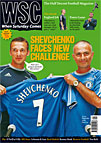 Has there ever been an England manager with so few fans as Steve McClaren? Middlesbrough supporter Harry Pearson struggles to locate the soul of the man
Has there ever been an England manager with so few fans as Steve McClaren? Middlesbrough supporter Harry Pearson struggles to locate the soul of the man
You may think the new England boss Steve McClaren is barely interesting enough to justify the term enigma, but there is certainly one thing that is intriguing about the Yorkshireman – the reaction he has produced on Teesside. The rubicund 45‑year‑old is far and away the most successful manager in Middlesbrough’s history. He led Boro to their first major trophy, to their highest League position since the Second World War, a European final and two FA Cup semi-finals, yet despite that I have not met a single Boro fan who mourns his departure.
It’s not that there is much animosity towards him either, you understand. That would make the whole thing altogether explicable. As it is not even his most vociferous critics can quite put their fingers on what it is that so grates about a man who has had the Future England Manager label stuck on him ever since he walked through the doors of the Riverside Stadium for the first time.
True, he annoyed fans with his early flirtation with the Leeds job – a boyhood dream, of course. McClaren was born in York in 1961 and it’s hard to see anyone with his orthodox sensibility rejecting Billy Bremner et al in favour of chanting along with the Bootham Crescent Nutter Squad. And the moment when he got all giddy over the chance to succeed Sir Bobby Robson at St James’ Park still rankles. Certainly his Blairite pronouncement that “we must educate the fans” got up a lot of pipes because, as one veteran remarked at the time: “I’ve been watching football for 40 years and nobody is going to teach me that turgid crap is bloody fantastic entertainment.” His habit of saying “tremendous” after the limpest display was irritating, right enough, as was his insistence on “taking positives” from thrashings.
It has to be said as well that under his guidance Boro played a lot of desperately dull football that no amount of last-minute 4-3 UEFA Cup wins can quite erase. And that possibly is the crux of it. “Big Mac” (as the tabloids dubbed him hopefully) comes tagged as a moderniser, a technocrat in the European style. At Middlesbrough he brought in a psychologist as his assistant and introduced vibrating warm-down chairs.
On the field things were altogether more predictable. To many fans McClaren’s main tactical innovation during his five-year reign appeared to be to instruct his team to spend the first 20 minutes of any match “taking the sting out of the game”, even at the Riverside. As such his was probably the only team in history who have set out to “silence the crowd” when they were playing at home.
Taken all in all, however, the reaction McClaren produced most was not anger, but apathy. Fans who were prepared to celebrate Colin Todd, Lennie Lawrence and Bryan Robson chanted his name so rarely that when they did – during an away game at Blackburn – people made a note of it.
There is nothing particularly the matter with McClaren. He isn’t boorish, bullying, a whiner, a moaner, or a bug-eyed mad man. He’s not an embarrassment. People simply didn’t warm to him. Maybe it was the caution of his pronouncements. In the countdown to taking the England job, rumour had it that he was taking lessons in presentation skills from an ITN newscaster. That seemed likely – after all, for most of his time at Boro he sounded like he was reading from an autocue. The politician’s smile, the measured tone of voice, the overriding sense that he was a man in transit, bound for something bigger and better.
McClaren is neither a bad man nor a bad manager. He is just a – what? Well, the word that springs to mind is “nonentity”. This is admittedly a harsh judgment on a man who was assistant manager at Manchester United when they won the treble, but it has to be said that, like a dream, McClaren seems to fade inexorably from your mind the moment he’s gone. His rise from lower-division scuffler to the pinnacle of English management has been so seamless and free of incident it recalls the famous dismissal of David Frost as a man who “rose without trace”. I can’t shake the feeling that he’s employed Max Clifford to ignite a few juicy scandals for him rather than defuse them.
The England boss is often said to look like a coach driver. But with his Fifties quiff, rosy cheeks and goofy grin he also calls to mind one of the minor characters from the holiday camp sitcom, Hi-De-Hi. He looks like the sort of bland, smiley Yellowcoat who would turn up occasionally to help the plot along (“You better come quick, Ted, the knobbly knees contest has turned nasty”), but not get any funny lines to deliver. Regular viewers would recognise him as part of the show but struggle to recall a single word he had said. In four years’ time England fans may feel exactly the same way.
From WSC 235 September 2006. What was happening this month
Fundamentally it was because he's ginger.